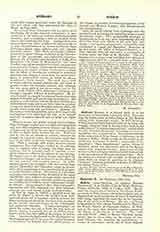

Guerard, ROBERT, b. at Rouen, 1641; d. at the monastery of Saint-Ouen, January 2, 1715. For some time he collaborated at Saint-Denys in the Maurist edition of St. Augustine’s works. In 1675, however, he had to leave Saint-Denys by order of the king, who wrongly suspected him of having had a hand In the publication of “L’Abbe commendataire”, a work which severely criticized the practice of holding and bestowing abbeys, etc., in commendam. His superior sent him to the monastery of Notre Dame, at Ambronay, in the Diocese of Belley. While in exile, he discovered at the Carthusian monastery of Portes a manuscript of St. Augustine’s “Opus imperfectum” against Julian of Eclanum, which was afterwards used in the Maurist edition of St. Augustine’s works. After a year of exile he was recalled, and spent the rest of his life successively at the monasteries of Fecamp and Saint-Ouen. He is the author of a biblical work entitled “L’Abrege de la sainte Bible en forme de questions et de reponses familieres”, which he published at Rouen in 1707 (latest edition, Paris, 1745).
MICHAEL OTT.

